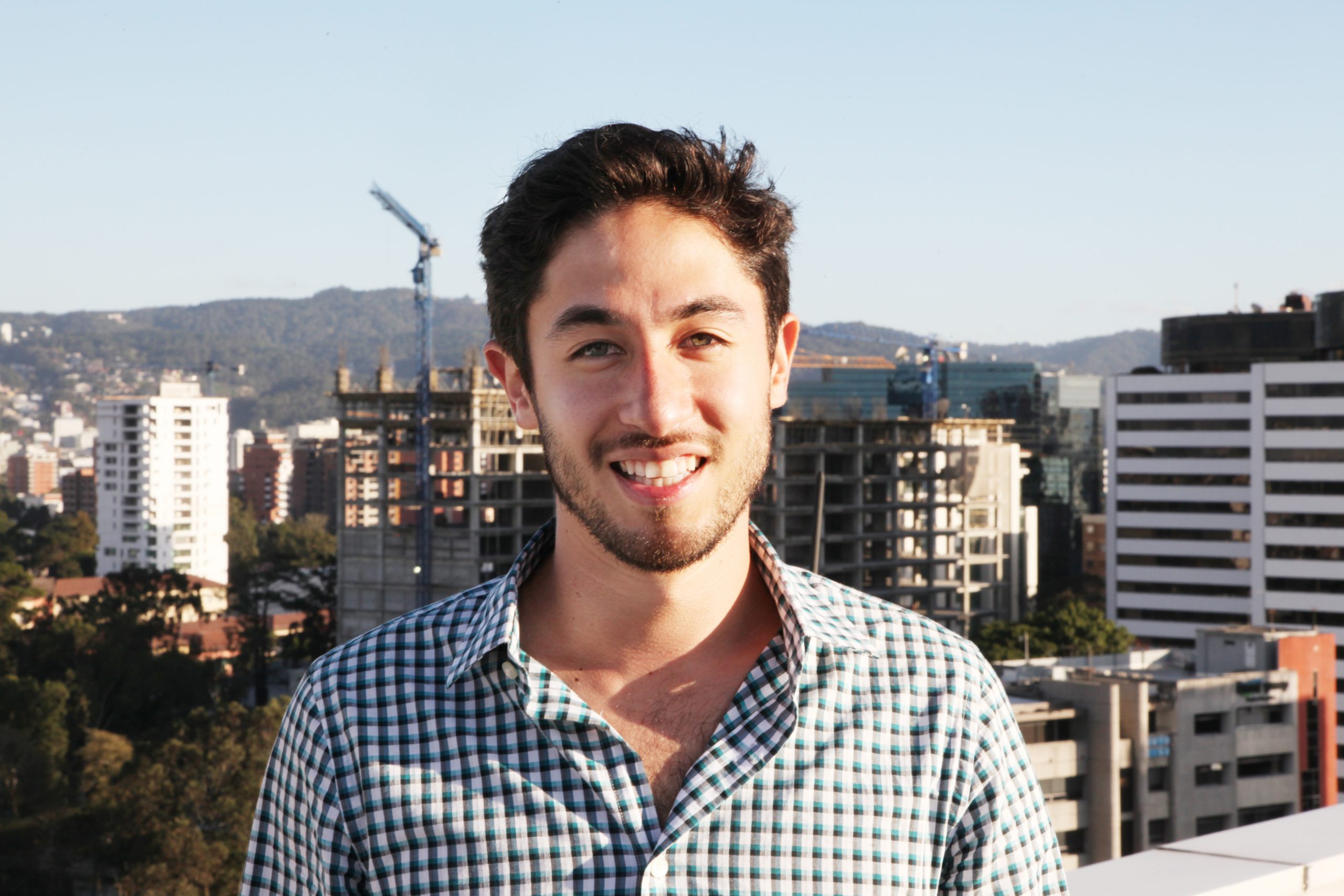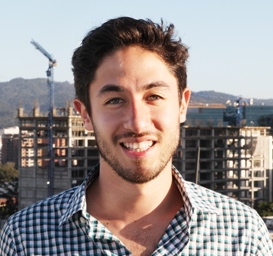
Alejandro Rivera Rivera talks about his work creating greener, more sustainable cities.
It is no use learning sophisticated techniques if you can’t implement them in Guatemala. And in Guatemala part of the problem is convincing the different stakeholders of the need for sustainable engineering.
Alejandro Rivera Rivera
For the first time in its history, there are now more people living in cities in Guatemala than in rural areas and by 2050 it is projected that 85% of the population in Latin America will live in cities.
Alejandro Rivera Rivera believes it is vital for countries like Guatemala to focus on how to make those cities better and more sustainable.
However, the construction industry is one of the least sustainable in the country and has a terrible record on greenhouse gas emissions. Alejandro, though, sees this as an opportunity rather than a drawback. “I want to make my career in an area where I can contribute to society and have an impact. The construction industry has the greatest potential for change,” he says.
This is slowly changing, he says, but he wants to fasten the pace of that change, whether that is through promoting more sustainable buildings or changing the building regulations to ensure environmental concerns are included.
Not only has he been working to promote green buildings, but he has co-founded the Guatemalan Network for Sustainable Cities which engages members of the public in projects and brainstorming on how to create better cities.
This autumn he will be starting an MPhil in Engineering for Sustainable Development at Cambridge with the support of a Gates Cambridge Scholarship and hopes this will further his goals of contributing to the greening of Guatemala’s cities.
Childhood
Alejandro was born in Mixco, a suburb of Guatemala City. At school he was top of his class and excelled at science and maths, coming second in Guatemala in the national maths Olympiad. But it was when he applied to the United World Colleges for his final year of high school that he says his life truly changed.
He applied when he was 16 when there was only one scholarship left for Latin American students. He didn’t get it, but the following year he got a call from the national UWC committee who had read his application and urged him to re-apply. There were five scholarships for Guatemala. Two hundred and fifty people applied and Alejandro was selected for the UWC school in Norway.
He spent two years there with 200 students from more than 85 different countries being taught in English. Alejandro was 17 at the time and had never been away from home for more than two weeks before that and had never been to Europe. “It opened up my horizons to studying abroad and made the world seem a smaller place. I realised that people from other countries are not that different and that there are similar issues all over the world,” he says. “It also opened up doors for me and gave me the confidence to apply to an Ivy League university in the US and then to Cambridge. I would not have done that before.”
In fact, Brown University where he did his undergraduate degree, gave a presentation at the school while he was there and was his top choice, in part due to the financial aid it was able to offer international students and to its open curriculum.
Alejandro’s time at the UWC also awakened an interest in environmental issues. Building a sustainable future is a key value for UWC schools. “Those values have shaped my academic and professional interests,” says Alejandro. While in Norway he was able to travel in Europe and could observe how different cities worked.
Building cities that work
He returned to Guatemala for the summer before he started his four-year degree course in Engineering at Brown. At Brown he was able to do a semester abroad in his third year and chose to go to the University of Melbourne in Australia. “Melbourne is ranked the most livable city in the world,” says Alejandro. “People look happy there. The public transport system works. Public spaces are well used. There are free concerts outside and a lot of cultural and sporting activities. People make the city their own,” he says. He took classes in engineering and philosophy, which he says helped to make him think about the natural world in a different way.
By the time he returned to Brown he had decided to specialise in civil engineering. He did a research project on sustainable buildings and at the end of his third year he did a three-month internship in Guatemala at the newly created Guatemala Green Building Council. His elder brother, who is also a civil engineer, had been to a conference about it and gave him contact details.
Alejandro worked with the council to develop its business plan as an emerging member of the World Green Building Council. “I had to research the green building industry in Guatemala which is still very much in development. There is growing interest in academia and some pioneering companies,” he says. He made a lot of contacts and was able to compare and contrast the cities he had visited since he went to Norway with those in Guatemala.
Once back at Brown, he attended Greenbuild, the US’ biggest expo and conference on green building and sustainability. “That confirmed what I wanted to do after I graduated,” he says.
After graduating, he returned to Guatemala and his name was put forward as director of the Guatemala Green Building Council. His cv was sent around council members and one member, the architectural firm Studio Domus, asked him to join them instead. They had designed and built the first two Leadership in Energy and Environmental Design [LEED] buildings in Guatemala. LEED is an internationally respected green building rating system and professional credential. At the time there were only two LEED associated professionals in Guatemala, compared to hundreds in the US and they had to be hired for every LEED project in the country. Alejandro studied for the qualification in his spare time and by October 2012 was a LEED AP, the third and youngest in his country. He has since got a further LEED credential and has been a LEED consultant on six of the 11 certified LEED projects in Guatemala.
“The hardest part of my job is to convince clients about the need for sustainable buildings,” he says. “The good news is that people are asking for it more often. Recent market research among potential clients and buyers of office space shows that sustainability ranks higher than security for the first time in my country. It shows how important this issue is becoming in Guatemala.”
Cambridge
In 2013 Alejandro applied to the University of Cambridge to further his studies in civil engineering. “Studying is a big part of my life and identity. I really value education and am aware that it has taken me this far in my life,” he says. He chose Cambridge for his masters because of its Engineering for Sustainable Development programme which provided a systems approach to sustainability problems. He was accepted on the course, but wasn’t shortlisted for the Gates Cambridge Scholarship so had to withdraw.
The following year he and some colleagues set up the Guatemalan Network for Sustainable Cities, which provides a citizens’ platform for improving cities. “It aims to inspire people and to share information which can empower them to make better choices and have an impact on public policy,” says Alejandro.
The Network was admitted to the Latin American Network for Sustainable Cities at the end of 2014. “It started as a Facebook page,” says Alejandro, who is the Network’s Director of Research. “We now have a team of 13 volunteers and a lot of different projects like City by Foot where we do a freewalking tour of cities every Sunday and share ideas and how the city is growing, what can be improved and what we are getting right,” he says.
Alejandro found out about a new project on low-income housing and tropical countries starting at Cambridge and re-applied for an MPhil in Engineering for Sustainable Development. “The great thing about Cambridge that it is focused on appropriate technologies for a country like mine,” he says. “It is no use learning sophisticated techniques if you can’t implement them in Guatemala. And in Guatemala part of the problem is convincing the different stakeholders of the need for sustainable engineering.”

Alejandro Rivera Rivera
- Alumni
- Guatemala
- 2015 MPhil Engineerng for Sustainable Dev
- Clare College
Born and raised in Mixco, Guatemala, I had only traveled to a handful of places until, at age 17, I was awarded a scholarship to attend UWC Red Cross Nordic in Norway. UWC would be the start of a transformative six-year journey that took me to academic institutions in 3 different continents and allowed me to visit over 30 distinct cities. These experiences, combined with the knowledge I acquired through my degree in Civil Engineering at Brown University, awoke my curiosity about the impact that the built environment has on the natural context and its inhabitants. Therefore, I became increasingly interested in the concepts surrounding high performance buildings and sustainable design. After graduating from Brown in 2012, I came back to Guatemala where I have been at the forefront of the local green building movement, working as the Engineering and Sustainability Coordinator for an architectural firm, and specializing on the LEED certification program. More recently, intrigued by how the ideas behind green buildings can be extrapolated to entire cities, I cofounded the Guatemalan Network for Sustainable Cities, where I currently serve as Research Director. I look forward to joining the MPhil in Engineering for Sustainable Development at Cambridge, with the conviction that it will enable me to tackle the ever more complex problems that engineers face in the process of finding sustainable solutions. I hope to use this knowledge to help build better cities in my home country.
Previous Education
Brown University












